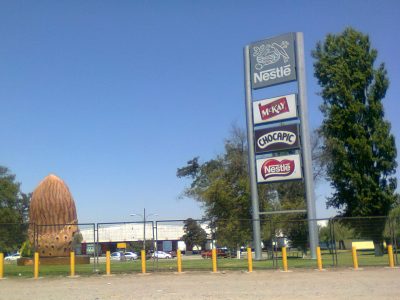‘All Eyes on Nestlé’: The Commodification and Privatization of Water

Ontario’s environment minister, Jeff Yurek, plans to announce the provincial government’s decision on water bottling permits by mid-December. The announcement comes after the government’s extension of a moratorium on new and expanded permits, put in place by the Liberal government in 2017. Doug Ford‘s government extended the moratorium until January 1, 2020.
Activist groups like Guelph-based Wellington Water Watchers (WWW) want Yurek to require all permits to take water for bottling to undergo an environmental assessment process. According to WWW, the current review process for water bottling permits is inadequate.
WWW also believes the scope of the current review process utilized by the Ministry of the Environment is too narrow and fails to recognize water as a public trust; does not guarantee Indigenous consent consistent with the United Nations Declaration on the Rights of Indigenous Peoples (UNDRIP); disregards the increasing threat of climate change; inadequately assesses the cumulative impact of water taking on groundwater; ignores the environmental impact of discarded plastic bottles; and neglects the health risks of microplastics in drinking water.
In addition, the Environmental Registry of Ontario limits public participation to a 90-day online consultation. This process prevents face-to-face discussion between members of the public and political representatives.
WWW is calling on the Ontario government to suspend the current review process for applications to renew water bottling permits to allow for a full public debate on the social and environmental impacts of water bottling and to ensure the government requires environmental assessments of all applications to renew permits to take water for bottling.
WWW is hosting four information sessions in November to focus “all eyes on Nestlé” and its corporate mandate. Representatives from groups affected by Nestlé water extraction in France, Brazil and the United States will speak about their experience protecting water from bottling in their communities.
Speakers at all four events include Bernhard and Renee-Lise Schmitt, founders of Collectif Eau 88 in Vittel, France, and Franklin Frederick, Brazilian political and environmental activist now living in Switzerland.
Collectif Eau 88 has been fighting for the agricultural life of Vittel since Nestlé corporation began purchasing land surrounding the town’s wells to establish rights to the water. The price of land increased to levels that put it out of reach for young farming families.
Nestlé eventually offered the land back to farmers free of charge, but required farmers to follow complex rules that prevented their accessing water beneath the land. Farmers were expected to truck in water to irrigate their crops and keep livestock alive.
Lax local laws in Vittel meant Nestlé has been able to draw 800 million litres of water annually for the past 30 years. The aquifer has been unable to replace the 3.5 centimetres of water removed annually, and both locals and Nestlé agree that the groundwater will be drained from Vittel’s aquifer within the next 20 years.

Source: SumOfUs/Flickr
Initially, the French government considered building a pipeline from a neighbouring community to bring water to the citizens of Vittel. That plan would have allowed Nestlé to continue draining the aquifer. However, on October 1, the French government announced it would limit Nestlé’s water extraction in Vittel and plans to cancel the water pipeline. The French government also imposed a moratorium on all pending applications by Nestlé.
The persistent opposition of Collectif Eau 88 is responsible for this partial victory. The government has signalled it will prioritize drinking water for residents. Water currently withdrawn from the aquifer will be reduced by at least one trillion litres per year, which means Nestlé will have to reduce its water mining. Ongoing consultations between the French government and Collectif Eau 88 will result in a strategy to ensure the aquifer remains sustainable.
Nestlé’s global plan involves buying land and building bottling plants in economically depressed areas. These are typically rural communities where the potential for jobs incentivizes communities to overlook environmental consequences. In the end, many of the jobs created are temporary, as the extraction process is mechanized.
Brazilian water activist Franklin Frederick arrived in Switzerland several years ago as part of an assignment by the Catholic Church in Sao Paulo to secure the support of Catholic and Protestant churches in Switzerland in a campaign against Nestlé water bottling operations back home. Frederick discovered Nestlé and the Swiss government were collaborating and working against non-profits opposed to Nestlé’s water extraction and bottling operations.
To learn more about the impacts of Nestlé’s privatization of water attend one of the following WWW information sessions:
- Monday, November 11, Waterloo, The Atrium, Renison University College, 240 Westmount Rd. N., 7 to 9 p.m. (RSVP here)
- Tuesday, November 12, Toronto, Wilson Hall Lounge, 2nd Floor Wilson Hall at New College, 40 Willcocks St., Toronto, 7 to 9 p.m. (RSVP here)
- Wednesday November 13, Hamilton, St. Joseph’s Church Hall, 280 Herkimer St., 7 to 9 p.m. (RSVP here)
- Thursday, November 14, Guelph, Trinity United Church, 400 Stevenson St. N., 7 to 9 p.m. Additional international speakers will present at this event only. (RSVP Here)
All four events will be live-streamed on Facebook. For more information email: [email protected]
*
Note to readers: please click the share buttons above or below. Forward this article to your email lists. Crosspost on your blog site, internet forums. etc.
Doreen Nicoll is a freelance writer, teacher, social activist and member of several community organizations working diligently to end poverty, hunger and gendered violence.

